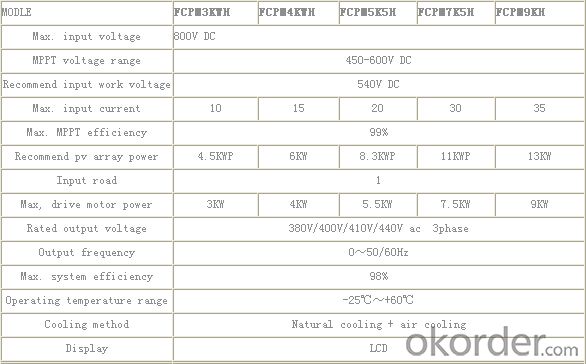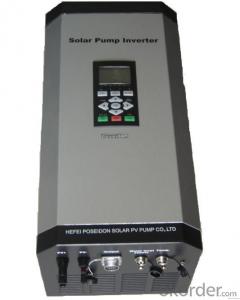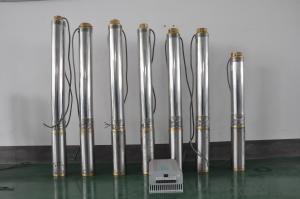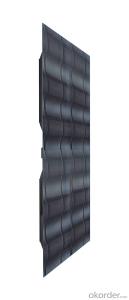Solar pump inverter FCPM4KWH
- Loading Port:
- China Main Port
- Payment Terms:
- TT OR LC
- Min Order Qty:
- -
- Supply Capability:
- -
OKorder Service Pledge
Quality Product, Order Online Tracking, Timely Delivery
OKorder Financial Service
Credit Rating, Credit Services, Credit Purchasing
You Might Also Like
Solar pump inverter FCPM4KWH Product Description:
Product Description:
Solar water pumping system is constructed with solar panel array,solar pump inverter and AC water pump, DC current produced from solar panel will be delivered to solar pump inverter,and it will convert it into AC current to drive water pump,and will automatically regulate output frequency according to sun radiance intensity,maximally realize MPPT tracking function.
Product Features
Adopting the proposed dynamic VI maximum power point tracking (MPPT) control method, with fast response, and reliable operation, achieves efficiency of 99%.
Designed with variable frequency driver, greatly improves efficiency
Extremely high efficiency
Digital mode control, with automatic operation and manual operation mode options
Complete protection functions
Adopts intelligent IPM module, with high reliability
LCD display and operation panel, in real time presents operating data
Optional for water level measurement and control circuit
Applicable for general ACC pumps, like centrifugal pump, piston pump etc.
Independent intellectual property; Highly effective, the redundant reliability, exempts the maintenance and the long life.
The pumps are soft started, fully protected.
No batteries are used. So better Sunlight, more water
Datasheet.

- Q:What is the lifespan of the solar panels used in a solar pump?
- The lifespan of solar panels used in a solar pump can vary but typically ranges from 25 to 30 years.
- Q:Can solar pumps be used for water supply in off-grid cabins or vacation homes?
- Yes, solar pumps can definitely be used for water supply in off-grid cabins or vacation homes. Solar-powered water pumps are an excellent solution for remote locations where access to electricity is limited or nonexistent. They harness energy from the sun, eliminating the need for grid connectivity or fuel-powered generators. Solar pumps are reliable, eco-friendly, and cost-effective, making them an ideal choice for off-grid water supply systems in cabins or vacation homes.
- Q:How does the cost of a solar pump compare to a diesel or electric pump?
- The cost of a solar pump is generally higher upfront compared to a diesel or electric pump. However, in the long run, solar pumps are more cost-effective due to their lower operational and maintenance expenses. They rely on free and renewable solar energy, eliminating fuel costs and reducing the need for regular maintenance. Additionally, solar pumps are more environmentally friendly, resulting in savings on emissions and potential government incentives.
- Q:Can a solar pump be used for water supply in fish hatcheries or fish farms?
- Yes, a solar pump can be used for water supply in fish hatcheries or fish farms. Solar pumps are a reliable and cost-effective solution for pumping water in areas where electricity is not readily available or expensive to access. They utilize solar energy to power the pump and do not require any fuel or electricity source. Solar pumps can be used for various purposes in fish hatcheries or fish farms, such as circulating water, aerating ponds, transporting water to different tanks or ponds, and maintaining optimal water quality for the fish. They can be easily installed and require minimal maintenance, making them suitable for remote locations or areas with limited resources. Using solar pumps for water supply in fish hatcheries or fish farms offers several advantages. Firstly, they are environmentally friendly as they rely on renewable solar energy, reducing the carbon footprint associated with traditional fuel-powered pumps. Secondly, they provide a consistent and reliable water supply, ensuring a healthy and sustainable environment for fish growth. Additionally, solar pumps can help reduce operational costs by eliminating the need for electricity or fuel consumption. It is important to select the appropriate solar pump size and capacity based on the specific requirements of the fish hatchery or fish farm. Factors such as the volume of water needed, the distance of water transport, and the elevation difference should be considered to determine the right solar pump for the application. In conclusion, solar pumps are a viable and efficient option for water supply in fish hatcheries or fish farms. They offer a sustainable and cost-effective solution, providing a reliable water source for the well-being and growth of fish in these environments.
- Q:Can a solar pump be used for water supply in horticulture farms?
- Yes, a solar pump can definitely be used for water supply in horticulture farms. Solar pumps are an environmentally friendly and cost-effective solution for irrigation purposes in agriculture. They harness solar energy to power the pump, eliminating the need for electricity or fuel. This makes them suitable for remote locations and farms with limited access to grid power. Solar pumps can efficiently provide water for irrigation, ensuring the optimal growth and health of plants in horticulture farms.
- Q:Are there any maintenance requirements for solar pumps?
- Yes, there are maintenance requirements for solar pumps. While solar pumps are generally low maintenance compared to traditional pumps, regular maintenance is still necessary to ensure their optimal performance and longevity. Some of the maintenance requirements for solar pumps include: 1. Cleaning: Regularly clean the solar panels to remove any dust, dirt, or debris that may accumulate on the surface. This will help maximize the solar panels' efficiency and ensure they generate enough power to operate the pump. 2. Inspections: Periodically inspect the pump system, including the motor, pump, and connections, to check for any signs of damage or wear. Look for loose or damaged wires, leaks, or any other issues that may affect the pump's performance. 3. Lubrication: Depending on the type of solar pump, lubrication may be required for the moving parts. Follow the manufacturer's guidelines and recommendations for lubricating the pump to ensure smooth operation. 4. Battery maintenance: If the solar pump includes a battery backup system, regular battery maintenance is essential. This may involve checking the battery levels, cleaning the battery terminals, and replacing batteries if necessary. 5. Professional servicing: It is advisable to have a professional service and inspect the solar pump system at least once a year to ensure everything is in good working order. They can perform more in-depth checks, provide any necessary repairs or replacements, and offer recommendations for optimal performance. By following these maintenance requirements, solar pump owners can ensure their systems operate efficiently and effectively, reducing the risk of breakdowns and extending the lifespan of the pump.
- Q:What is the maximum elevation a solar pump can pump water to?
- The maximum elevation a solar pump can pump water to will depend on various factors such as the power and efficiency of the solar panel, the capacity and pressure of the pump, as well as the distance and elevation between the water source and the desired destination. In general, solar pumps are capable of pumping water to elevations ranging from a few meters to several hundred meters. However, it is important to note that as the elevation increases, the pumping capacity of the solar pump may decrease due to the effects of gravity and friction in the pumping system. Additionally, the efficiency of the solar panel may also be affected by factors such as shading, orientation, and weather conditions, which can further impact the maximum elevation the pump can reach. To determine the specific maximum elevation a solar pump can achieve, it is recommended to consult the manufacturer's specifications and guidelines for the particular solar pump model being used. Additionally, seeking advice from a professional or a solar pump expert can help in accurately assessing the maximum elevation capabilities based on the specific requirements and conditions of the pumping system.
- Q:Can a solar pump be used for water supply in remote military bases?
- Yes, a solar pump can be used for water supply in remote military bases. Solar pumps are an efficient and sustainable option for supplying water in remote areas where traditional electricity sources may not be available or reliable. The use of solar energy eliminates the need for fuel and reduces operational costs. Additionally, solar pumps are easy to install, require minimal maintenance, and can provide a reliable water supply for various military operations.
- Q:How does a solar pump handle water with high levels of algae or cyanobacteria blooms?
- A solar pump can handle water with high levels of algae or cyanobacteria blooms by utilizing various filtration systems. These systems, such as screens or mesh filters, help prevent algae or cyanobacteria from entering the pump system, thus reducing the risk of clogging or damage. Additionally, some solar pumps have built-in UV sterilizers that destroy algae or cyanobacteria cells, ensuring cleaner water output. Overall, solar pumps are designed to handle water with high levels of algae or cyanobacteria blooms effectively and efficiently.
- Q:What is the maximum head lift of a solar pump?
- The maximum head lift of a solar pump refers to the maximum vertical distance that the pump can lift water from a source to the discharge point. This measurement is affected by various factors such as the power of the solar panels, the size and efficiency of the pump, and the diameter and length of the pipes. The specific maximum head lift can vary depending on the model and specifications of the solar pump being used.
1. Manufacturer Overview |
|
|---|---|
| Location | |
| Year Established | |
| Annual Output Value | |
| Main Markets | |
| Company Certifications | |
2. Manufacturer Certificates |
|
|---|---|
| a) Certification Name | |
| Range | |
| Reference | |
| Validity Period | |
3. Manufacturer Capability |
|
|---|---|
| a)Trade Capacity | |
| Nearest Port | |
| Export Percentage | |
| No.of Employees in Trade Department | |
| Language Spoken: | |
| b)Factory Information | |
| Factory Size: | |
| No. of Production Lines | |
| Contract Manufacturing | |
| Product Price Range | |
Send your message to us
Solar pump inverter FCPM4KWH
- Loading Port:
- China Main Port
- Payment Terms:
- TT OR LC
- Min Order Qty:
- -
- Supply Capability:
- -
OKorder Service Pledge
Quality Product, Order Online Tracking, Timely Delivery
OKorder Financial Service
Credit Rating, Credit Services, Credit Purchasing
Similar products
New products
Hot products
Hot Searches
Related keywords



























